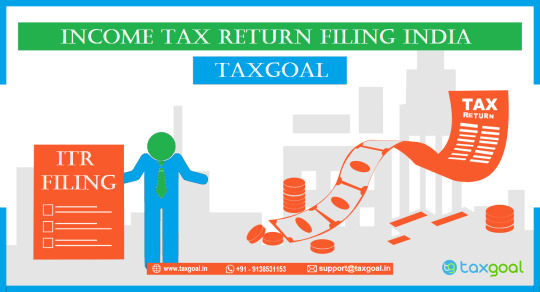#ResidentialStatus
Text

Determination of Residential Status in India assesses an individual's tax liability based on their stay in the country. Residents are taxed on global income, while non-residents are taxed only on Indian income. This status affects the scope and amount of taxable income under Indian law.
0 notes
Text
Who has to File an Income Tax Return Mandatorily in Delhi?
In the bustling metropolis of Delhi, navigating the maze of income tax regulations can be daunting. Understanding who is obligated to file an income tax return is crucial for every resident. Let's delve into the criteria that make income tax return filing mandatory in Delhi and explore key considerations to streamline the process effectively.

Criteria for Mandatory Income Tax Return Filing in Delhi
Resident Status: Individuals residing in Delhi, whether citizens or non-citizens, are required to file an income tax return if their total income exceeds the prescribed threshold set by the Income Tax Department.
Income Thresholds: The income thresholds vary depending on the age and residential status of the individual. For instance, for the assessment year 2023-24, individuals below 60 years of age with an income exceeding ₹2.5 lakhs are required to file returns. For senior citizens aged 60 to 80, the threshold is ₹3 lakhs, and for super senior citizens above 80 years, it stands at ₹5 lakhs.
Understanding Income Thresholds and Eligibility
Age-based Thresholds: The income tax slabs and thresholds are categorized based on age to provide relief to different segments of taxpayers. It's essential to ascertain the correct slab applicable to your age group to determine your tax filing obligations accurately.
Types of Income: Apart from salary income, various sources such as rental income, interest income, capital gains, and income from business or profession contribute to the total income. Individuals must consider all sources of income to assess whether they meet the mandatory filing criteria.

Implications of Residential Status on Tax Filing Obligations
Resident vs. Non-Resident: The residential status of an individual greatly impacts their tax liabilities. Residents are taxed on their global income, including income earned abroad, whereas non-residents are taxed only on income earned in India. Understanding your residential status is crucial for determining your tax filing obligations accurately.
Double Taxation Avoidance: Individuals who qualify as residents in more than one country may be subjected to double taxation. It's imperative to leverage double taxation avoidance agreements, if applicable, to prevent paying taxes on the same income in multiple jurisdictions.
Importance of Aadhaar Linking and PAN Verification
Aadhaar Linking: Linking Aadhaar with PAN is mandatory for filing income tax returns. It streamlines the verification process and helps in curbing tax evasion by ensuring transparency and authenticity in financial transactions.
PAN Verification: Verifying PAN details ensures that the information provided in the tax return is accurate and matches the records with the Income Tax Department. Any discrepancies in PAN Registration details can lead to delays or rejections in the filing process.

Streamlining the Process With Taxgoal: Online ITR Filing in Delhi
Simplified Online Filing: Taxgoal provides a user-friendly platform for individuals to file their income tax returns seamlessly. With step-by-step guidance and intuitive interfaces, taxpayers can navigate through the filing process effortlessly.
Expert Assistance: Taxgoal offers expert assistance to address queries and provide personalized tax advice. Whether you're a salaried individual, a freelancer, or a business owner, Taxgoal caters to diverse tax filing needs with precision and reliability.
Conclusion
Navigating the intricacies of regulations For Income Tax Return Filing in Delhi requires a clear understanding of the criteria for mandatory filing and compliance with verification procedures. By leveraging technology-driven solutions like Taxgoal, taxpayers can streamline the filing process and ensure adherence to regulatory requirements, thus fostering a culture of tax compliance and transparency.
Final Words
As Delhi continues to evolve as a dynamic economic hub, staying abreast of tax regulations is paramount for individuals to fulfill their civic responsibilities and contribute to the nation's growth story. With the right tools and knowledge at their disposal, taxpayers can navigate the tax landscape with confidence and efficiency.

#Taxgoal#IncomeTax#TaxFiling#DelhiTax#TaxRegulations#Aadhaar#PANVerification#TaxCompliance#ResidentialStatus#TaxThresholds#OnlineFiling#DoubleTaxation#TaxationLaws#FinancialCompliance#TaxAdvice
0 notes
Photo

There have been sweeping changes to the Indian tax laws with respect to residential status of an individual which may result in expanding his tax base in India and he may qualify to be a ‘stateless’ person.
Recent changes to Residential Status definition under the Income Tax Act. If you are an NRI - this article, first in the series, is a must-read.
Read Now: https://bit.ly/2ZSSSvw
0 notes
Text
Residential status of Individual under the Income Tax Act as amended by Finance Act 2020
Introduction
The Finance Act 2020 has amended the section 6 in which the new provision of Deemed resident has been inserted and certain provisions have been amended to widen the tax base for the Individual / HUF. Section 6 is the main factor in determining whether the assessee is resident or not and thus determining the taxability of the same.
Types of Residents
In the section 6, for the purpose…
View On WordPress
#finance act 2020#financeact2020#incometax#residential status#residentialstatus#section6#tax charcha#tax charcha.com#taxcharcha.com#taxcharcha
0 notes
Text
“Residential status in India dictates income tax liability. It classifies individuals as Residents or Non-Residents based on physical presence, influencing taxation on global income for Residents. Understanding these classifications is crucial for tax compliance and optimizing financial strategies.”
#ResidentialStatus#IncomeTax#Taxation#India#FinancialPlanning#TaxCompliance#ResidentStatus#NonResident#DTAA#TaxLiability
0 notes